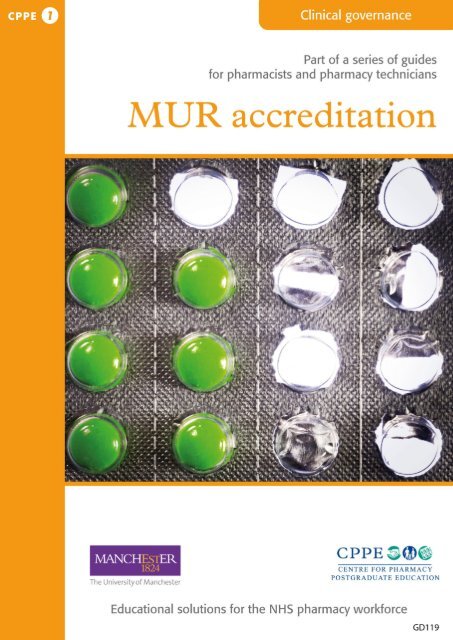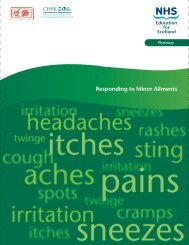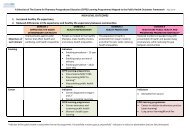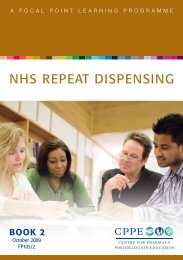this guide to MUR accreditation - CPPE
this guide to MUR accreditation - CPPE
this guide to MUR accreditation - CPPE
Create successful ePaper yourself
Turn your PDF publications into a flip-book with our unique Google optimized e-Paper software.
Page 1
Acknowledgements<br />
Lead writer and programme developer<br />
Layla Fattah, learning development pharmacist, <strong>CPPE</strong><br />
<strong>CPPE</strong> reviewers<br />
Chris<strong>to</strong>pher Cutts, direc<strong>to</strong>r<br />
Matthew Shaw, deputy direc<strong>to</strong>r<br />
Angela Alexander, regional manager, South Central<br />
Paula Higginson, senior learning development pharmacist<br />
Lesley Grimes, senior learning development pharmacist<br />
Tiffany Barrett, regional manager, South West<br />
Michelle Styles, regional manager, London<br />
Edi<strong>to</strong>r<br />
Neil Condron, edi<strong>to</strong>r, <strong>CPPE</strong><br />
Production<br />
Cover artwork by Pansophix Ltd.<br />
Published in January 2013 (originally published in July 2011) by the Centre for<br />
Pharmacy Postgraduate Education, School of Pharmacy and Pharmaceutical<br />
Sciences, University of Manchester, Oxford Road, Manchester M13 9PT.<br />
http://www.cppe.ac.uk
<strong>MUR</strong> <strong>accreditation</strong> – January 2013 edition<br />
Welcome <strong>to</strong> <strong>this</strong> <strong>guide</strong> <strong>to</strong> <strong>MUR</strong> <strong>accreditation</strong><br />
The Centre for Pharmacy Postgraduate Education (<strong>CPPE</strong>) has developed <strong>this</strong><br />
<strong>guide</strong> as part of a series of learning and support resources for clinical<br />
governance.<br />
Learning with <strong>CPPE</strong><br />
About <strong>CPPE</strong><br />
The Centre for Pharmacy Postgraduate Education (<strong>CPPE</strong>) offers a wide range of<br />
learning opportunities for the pharmacy workforce. We are based in the<br />
University of Manchester’s School of Pharmacy and Pharmaceutical Sciences and<br />
are funded by the Department of Health (DH) <strong>to</strong> provide continuing education for<br />
practising pharmacists and pharmacy technicians providing NHS services in<br />
England.<br />
<strong>CPPE</strong> <strong>guide</strong>s<br />
We have developed a series of <strong>guide</strong>s within our learning portfolio <strong>to</strong> advise you<br />
and support your learning in many different areas. Each <strong>guide</strong> covers a range of<br />
approaches <strong>to</strong> help you develop and apply key skills and techniques <strong>to</strong> your own<br />
practice.<br />
Many of the <strong>guide</strong>s provide <strong>to</strong>olkits <strong>to</strong> help you <strong>to</strong> document and plan your<br />
development, while others demonstrate pharmacy-specific situations <strong>to</strong> help you<br />
put your learning in<strong>to</strong> context. Some of them recommend that you work with a<br />
men<strong>to</strong>r <strong>to</strong> support you in your development.<br />
Our full portfolio of <strong>guide</strong>s is online at http://www.cppe.ac.uk/<strong>guide</strong>s.<br />
http://www.cppe.ac.uk/<strong>guide</strong>s Page 1
<strong>MUR</strong> <strong>accreditation</strong> – January 2013 edition<br />
About <strong>this</strong> <strong>guide</strong> <strong>to</strong> <strong>MUR</strong> <strong>accreditation</strong><br />
The purpose of <strong>this</strong> <strong>guide</strong> is <strong>to</strong> support pharmacists who want <strong>to</strong> learn how <strong>to</strong><br />
become accredited <strong>to</strong> deliver the medicines use review (<strong>MUR</strong>) service. This <strong>guide</strong><br />
is divided in<strong>to</strong> two parts. Part 1 will give you general information about the <strong>MUR</strong><br />
service and will signpost you <strong>to</strong> the most appropriate places for your learning and<br />
<strong>to</strong> other key resources. Part 2 will provide you with advice <strong>to</strong> help you<br />
successfully complete the <strong>CPPE</strong> and University of Manchester <strong>MUR</strong> assessment.<br />
Part 1<br />
Why should you become <strong>MUR</strong> accredited<br />
An <strong>MUR</strong> is a structured review conducted by a pharmacist <strong>to</strong> help patients<br />
manage their medicines more effectively. It was the first advanced service within<br />
the community pharmacy contractual framework. The <strong>MUR</strong> service includes <strong>MUR</strong>s<br />
undertaken periodically for patients taking multiple medicines, as well as<br />
prescription intervention <strong>MUR</strong>s, which are triggered by a significant problem with<br />
a patient’s prescription.<br />
The <strong>MUR</strong> service was introduced by the government as a way of helping patients<br />
use their medicines more effectively. The aim of the service is <strong>to</strong> improve patient<br />
knowledge, concordance and use of medicines by:<br />
establishing the patient’s actual use, understanding and experience of<br />
taking their medicines<br />
identifying, discussing and resolving poor or ineffective use of their<br />
medicines<br />
identifying side-effects and drug interactions that may affect patient<br />
compliance<br />
improving the clinical and cost effectiveness of prescribed medicines and<br />
reducing medicine wastage.<br />
During an <strong>MUR</strong>, the pharmacist will review the patient’s use of their medicines,<br />
ensuring that they understand why those medicines have been prescribed and<br />
how they can get the most benefit from them. The pharmacist will identify any<br />
problems and, where necessary, provide feedback <strong>to</strong> the prescriber. This allows<br />
them <strong>to</strong> highlight any issues and make recommendations on an action plan<br />
agreed with the patient using the appropriate <strong>MUR</strong> documentation.<br />
Benefits of the <strong>MUR</strong> service include more effective medicines use, reduced<br />
medicines waste and improved medicines compliance, which in turn should lead<br />
<strong>to</strong> better health outcomes for the patient.<br />
In order <strong>to</strong> provide <strong>this</strong> service, pharmacists must be accredited. Pharmacies are<br />
able <strong>to</strong> claim a fee for completing <strong>MUR</strong>s; your employer may request that you<br />
are accredited, and you may find it advantageous if you wish <strong>to</strong> work as a locum<br />
pharmacist in community pharmacy.<br />
http://www.cppe.ac.uk/<strong>guide</strong>s Page 2
<strong>MUR</strong> <strong>accreditation</strong> – January 2013 edition<br />
What <strong>accreditation</strong> do you need if you wish <strong>to</strong><br />
provide <strong>MUR</strong> services<br />
The regula<strong>to</strong>ry framework for <strong>MUR</strong> service provision is set out in the Secretary of<br />
State Directions (see the section titled What legal requirements will you need <strong>to</strong><br />
meet for more details). The Directions require any pharmacist providing the<br />
<strong>MUR</strong> service <strong>to</strong> have satisfac<strong>to</strong>rily completed an assessment set by a Higher<br />
Education Institution (HEI) and based on the national competency framework.<br />
You must be able <strong>to</strong> provide evidence of <strong>this</strong> in the form of an <strong>MUR</strong> certificate,<br />
which is a statement of satisfac<strong>to</strong>ry performance awarded or endorsed by an<br />
HEI.<br />
There are a number of different providers of an accredited <strong>MUR</strong> competency<br />
assessment, but each one of them needs you <strong>to</strong> demonstrate that you have<br />
achieved the competencies outlined in the competency framework that the DH<br />
agreed with the Pharmaceutical Services Negotiating Committee (PSNC).<br />
You must be able <strong>to</strong> show that you:<br />
have gained an appropriate level of clinical knowledge<br />
understand the law relating <strong>to</strong> providing <strong>MUR</strong>s<br />
can apply these in the <strong>MUR</strong> consultation<br />
In Part 2 of <strong>this</strong> <strong>guide</strong>, we will discuss the University of Manchester’s assessment<br />
for <strong>accreditation</strong>, hosted by <strong>CPPE</strong>. However, the following HEIs also provide <strong>MUR</strong><br />
<strong>accreditation</strong>:<br />
University of Reading http://www.reading.ac.uk<br />
Skills for <strong>MUR</strong>s (C+D, Medway School of Pharmacy and PSNC)<br />
http://www.skillsformurs.co.uk<br />
Wales Centre for Pharmacy Professional Education / Welsh School of<br />
Pharmacy http://www.wcppe.org.uk<br />
University of Bath http://www.bath.ac.uk<br />
Keele University http://www.keele.ac.uk<br />
Queen’s University Belfast http://www.qub.ac.uk<br />
Some provide learning materials and each of them has their own individual style<br />
of assessment. You will need <strong>to</strong> review each of them <strong>to</strong> decide which is best for<br />
you. Further information can be found on the PSNC website<br />
(http://www.psnc.org.uk/pages/pharmacist_mur_<strong>accreditation</strong>.html) or on the<br />
individual HEI websites.<br />
http://www.cppe.ac.uk/<strong>guide</strong>s Page 3
<strong>MUR</strong> <strong>accreditation</strong> – January 2013 edition<br />
How should you prepare <strong>to</strong> gain <strong>MUR</strong><br />
<strong>accreditation</strong><br />
Where you start with your learning on <strong>MUR</strong> will depend on your own personal<br />
learning needs. Good communication skills are key <strong>to</strong> delivering the <strong>MUR</strong> service,<br />
so you should ensure your consultation skills are of a high standard. You can<br />
further develop your consultation skills through <strong>CPPE</strong> by taking a look at the<br />
<strong>CPPE</strong> open-learning programme, Patient-centred care. There may also be a<br />
consultation skills workshop available in your area (you can find <strong>CPPE</strong> events in<br />
your area by visiting http://www.cppe.ac.uk/events).<br />
You will need <strong>to</strong> ensure that the appropriate skill mix among staff is in place in<br />
your pharmacy <strong>to</strong> ensure dispensing and other services are maintained <strong>to</strong> a high<br />
standard. This may involve developing your organisational skills and delegating<br />
roles <strong>to</strong> other trained members of the team. You may also find it useful <strong>to</strong><br />
develop your influencing skills <strong>to</strong> assist you in communicating with GPs and<br />
commissioners on the <strong>MUR</strong> service. If you need help advancing any of these<br />
skills, then <strong>CPPE</strong> offers a range of <strong>guide</strong>s <strong>to</strong> support you. Further details can be<br />
found in the Personal development and Management and leadership portfolios on<br />
the Guides section of the <strong>CPPE</strong> website (http://www.cppe.ac.uk/<strong>guide</strong>s).<br />
What legal requirements will you need <strong>to</strong> meet<br />
If you offer an <strong>MUR</strong> service then there are legal requirements <strong>to</strong> which you must<br />
adhere. These requirements, called Directions, can be found in Part VIC of the<br />
Drug Tariff, under Medicines Use Review (<strong>MUR</strong>) and Prescription Intervention (PI)<br />
Service. Your pharmacy premises must also meet certain requirements before<br />
you can offer an <strong>MUR</strong> service. The Directions will give you full details should you<br />
need them.<br />
What guidance documents will you need <strong>to</strong><br />
consider<br />
Before you attempt any form of <strong>MUR</strong> assessment, it is important that you are<br />
familiar with the guidance documents on <strong>MUR</strong>. These will outline the <strong>guide</strong>lines<br />
and ethical points which you need <strong>to</strong> consider.<br />
A good place <strong>to</strong> start is on the PSNC website, where you will be able <strong>to</strong> access<br />
the service specification for <strong>MUR</strong>s and the prescription intervention service. This<br />
is available at<br />
http://www.psnc.org.uk/data/files/PharmacyContractandServices/AdvancedServi<br />
ces/<strong>MUR</strong>_service_spec_-_Sept_2012.pdf.<br />
http://www.cppe.ac.uk/<strong>guide</strong>s Page 4
<strong>MUR</strong> <strong>accreditation</strong> – January 2013 edition<br />
The Guidance on the Medicines Use Review service (September 2012) document<br />
provides important information on the current requirements for the <strong>MUR</strong> service<br />
and details of the changes <strong>to</strong> the <strong>MUR</strong> service that came in<strong>to</strong> effect on 1 Oc<strong>to</strong>ber<br />
2011. This document will provide helpful information when attempting section 2<br />
of the <strong>CPPE</strong> <strong>MUR</strong> <strong>accreditation</strong> assessment. It is available at<br />
http://www.psnc.org.uk/data/files/PharmacyContract/Contract_changes_2011/M<br />
UR_guidance_Sept_2012.pdf.<br />
The key requirements of the <strong>MUR</strong> service from <strong>this</strong> guidance are:<br />
the introduction of three national target groups<br />
at least 50 per cent of all <strong>MUR</strong>s must be undertaken on patients<br />
who fall within one or more of the national target groups<br />
patients must give their signed consent <strong>to</strong> receive the <strong>MUR</strong> service<br />
and for their information <strong>to</strong> be shared with the GP, primary care<br />
trust, NHS Business Services Authority and the Secretary of State<br />
for Health<br />
the pharmacy must provide information <strong>to</strong> the primary care trust,<br />
on request, from the records of <strong>MUR</strong>s undertaken.<br />
Further information is available from the above PSNC document.<br />
You can also access the PSNC’s <strong>MUR</strong> information page at<br />
http://www.psnc.org.uk/pages/mur.html.<br />
Top tip<br />
You need <strong>to</strong> be able <strong>to</strong> differentiate a legal requirement from a good practice<br />
requirement. Take the time <strong>to</strong> write down exactly what the service specification<br />
and law requires you <strong>to</strong> do. Compare the law with what you consider <strong>to</strong> be good<br />
practice.<br />
Targeting your <strong>MUR</strong>s<br />
From 1 Oc<strong>to</strong>ber 2011, at least 50 percent of <strong>MUR</strong>s must be with patients from<br />
one of the national target patient groups. These are patients who either:<br />
are prescribed certain respira<strong>to</strong>ry drugs<br />
take a high-risk medicine (on a national list)<br />
have been recently discharged from hospital and have had changes made<br />
<strong>to</strong> their medicines while in hospital.<br />
Further national target groups will be identified after the initial implementation.<br />
This change <strong>to</strong> the service is intended <strong>to</strong> ensure that <strong>MUR</strong>s are provided <strong>to</strong> those<br />
who will benefit most. It is also intended <strong>to</strong> provide commissioners with<br />
assurance that the service is high quality and provides value for money as well<br />
as patient benefits. <strong>CPPE</strong> has produced a <strong>guide</strong> <strong>to</strong> targeting your <strong>MUR</strong>s<br />
effectively, which is available at http://www.cppe.ac.uk/<strong>guide</strong>s.<br />
http://www.cppe.ac.uk/<strong>guide</strong>s Page 5
<strong>MUR</strong> <strong>accreditation</strong> – January 2013 edition<br />
What level of clinical knowledge will you need<br />
It is important <strong>to</strong> remember that an <strong>MUR</strong> focuses on the patient’s use of their<br />
medicines and is not a clinical review. The clinical knowledge you will require <strong>to</strong><br />
conduct an <strong>MUR</strong> is primarily related <strong>to</strong> the British National Formulary (BNF), so it<br />
will be helpful for you <strong>to</strong> be familiar with the different sections and appendices<br />
within <strong>this</strong> resource. You will then be able <strong>to</strong> access the information quickly<br />
during the consultation.<br />
However, if you feel you need <strong>to</strong> brush up on a particular clinical area, you will<br />
find that <strong>CPPE</strong> learning programmes may support your individual learning<br />
requirements. <strong>CPPE</strong> also runs focal point events covering a range of clinical<br />
<strong>to</strong>pics and venues across England. Take a look at the <strong>CPPE</strong> website<br />
(http://www.cppe.ac.uk) for further details of programmes and events in your<br />
area.<br />
If you need <strong>to</strong> find information about specific medicines, the electronic Medicines<br />
Compendium (http://www.medicines.org.uk) has summaries of product<br />
characteristics and patient information leaflets which you can view online or<br />
download and print.<br />
Prodigy is a reliable source of evidence-based information and practical ‘know<br />
how’ about the common conditions managed in primary care. The website can be<br />
accessed at http://www.prodigy.nhs.uk.<br />
What records will you need <strong>to</strong> keep<br />
To demonstrate the value of the <strong>MUR</strong> service, it is essential that data is collected<br />
<strong>to</strong> show the benefits of the service <strong>to</strong> patients. Direction 5(1)(j) requires the<br />
pharmacy contrac<strong>to</strong>r <strong>to</strong> provide the primary care trust, on request, information<br />
on the records of <strong>MUR</strong>s undertaken. An electronic reporting template has been<br />
approved by the Secretary of State <strong>to</strong> facilitate <strong>this</strong> data collection. There is more<br />
information relating <strong>to</strong> the specific data which must be collected in the PSNC<br />
guidance document referred <strong>to</strong> in <strong>this</strong> <strong>guide</strong>.<br />
http://www.cppe.ac.uk/<strong>guide</strong>s Page 6
<strong>MUR</strong> <strong>accreditation</strong> – January 2013 edition<br />
Part 2<br />
How does the University of Manchester (hosted<br />
by <strong>CPPE</strong>) <strong>accreditation</strong> process work<br />
<strong>CPPE</strong> does not have a specific learning programme <strong>to</strong> support the <strong>MUR</strong><br />
assessment. Instead we advise you <strong>to</strong> familiarise yourself with the documents<br />
outlined in Part 1 of <strong>this</strong> <strong>guide</strong>, which should prepare you for the assessment.<br />
<strong>CPPE</strong> hosts the University of Manchester assessment, which is only available<br />
online. It tests your individual knowledge, skills and behaviours in line with the<br />
DH’s Competency Framework for the Assessment of Pharmacists Providing the<br />
Medicines Use Review (<strong>MUR</strong>) and Prescription Intervention (PI) Service.<br />
The assessment is certificated by the University of Manchester. In line with other<br />
<strong>MUR</strong> <strong>accreditation</strong> providers, <strong>CPPE</strong> charges a fee of £65 <strong>to</strong> access the<br />
assessment. This will give you access <strong>to</strong> the assessment for one year.<br />
What is the format of the University of<br />
Manchester <strong>MUR</strong> assessment, hosted by <strong>CPPE</strong><br />
There are four sections <strong>to</strong> the <strong>CPPE</strong> assessment, as shown below.<br />
Section Title<br />
1 Clinical Pharmacy and<br />
Pharmaceutical Care<br />
2 The Medicines Use Review (<strong>MUR</strong>)<br />
Service<br />
3 Medicines Use Review (<strong>MUR</strong>) and<br />
Prescription Intervention (PI)<br />
Case Studies<br />
4 Bringing it all <strong>to</strong>gether –<br />
undertaking the full <strong>MUR</strong> process<br />
Format of section<br />
30 multiple choice questions<br />
10 x 4 true/false questions<br />
2 case studies each with 5<br />
true/false questions<br />
Use of patient data <strong>to</strong><br />
complete <strong>MUR</strong><br />
documentation<br />
<br />
<br />
<br />
<br />
<br />
Each section is allocated a set time and you need <strong>to</strong> complete each section<br />
within the time allocated.<br />
Each section addresses key areas of the <strong>MUR</strong> process.<br />
There is an introduction <strong>to</strong> each section which explains the content and<br />
assessment process within that section. If you are unfamiliar with online<br />
assessment, the introduction provides examples of the IT mechanisms you<br />
need <strong>to</strong> be able <strong>to</strong> use in that section.<br />
You must do each section sequentially and you must pass each section<br />
before you can move on <strong>to</strong> the next one.<br />
Once you have started, you will have a maximum period of 49 days <strong>to</strong><br />
complete the full assessment. After <strong>this</strong> period you must restart the<br />
assessment from the beginning.<br />
http://www.cppe.ac.uk/<strong>guide</strong>s Page 7
<strong>MUR</strong> <strong>accreditation</strong> – January 2013 edition<br />
<br />
<br />
After you complete each section you will be <strong>to</strong>ld whether you have passed<br />
or failed.<br />
Some of the questions have been classed as ‘significant’. The knowledge<br />
being assessed in these questions is considered <strong>to</strong> be critical. If you<br />
answer a significant question incorrectly you will au<strong>to</strong>matically fail a<br />
section. You will not be <strong>to</strong>ld which of the questions in the assessment are<br />
significant but you will be <strong>to</strong>ld at the end of the section that you answered<br />
a significant question incorrectly.<br />
What happens if you fail one of the sections<br />
If you fail one of the sections you will receive a message at the end of the<br />
section telling you <strong>this</strong>. You will then need <strong>to</strong> wait six days before you can retake<br />
the section and continue with the assessment.<br />
This ‘lockout’ period will give you an opportunity <strong>to</strong> reflect on your learning needs<br />
and undertake any appropriate self-directed learning. It also helps <strong>to</strong> maintain<br />
the integrity of the assessment. If you fail any section three times, after the<br />
lockout period you will have <strong>to</strong> restart the assessment from the beginning at<br />
section 1.<br />
What advice will help you <strong>to</strong> successfully<br />
complete the University of Manchester <strong>MUR</strong><br />
assessment, hosted by <strong>CPPE</strong><br />
<br />
<br />
<br />
<br />
<br />
<br />
<br />
Before you start, make sure you have a reliable internet connection. Any<br />
failure of connection will result in failing the section you are attempting.<br />
You should attempt the assessment under ‘exam conditions’. Find a quiet<br />
place where you are unlikely <strong>to</strong> be interrupted and complete the<br />
assessment on your own. You will need <strong>to</strong> be able <strong>to</strong> concentrate, so try<br />
not <strong>to</strong> do the assessment late at night, after a busy day's work or when<br />
there are other distractions.<br />
Read the introduction text <strong>to</strong> each of the sections of the assessment. This<br />
will provide you with valuable information on the format and content of<br />
that section.<br />
Read the question and answer options carefully, but do not over-interpret<br />
them. It is important <strong>to</strong> take the questions at face value and base your<br />
answers on the information you have been given.<br />
Use a watch or clock <strong>to</strong> keep track of the time. Depending on the speed of<br />
your internet connection, the onscreen timer may not be accurate and<br />
time is short in many of the sections.<br />
Use the most recent copy of the BNF and have any other resources you<br />
think you may need <strong>to</strong> hand.<br />
Read all of the information on the <strong>CPPE</strong> website about the assessment. To<br />
read <strong>this</strong>, go <strong>to</strong> assessment in the <strong>to</strong>p menu bar and choose <strong>MUR</strong><br />
assessment from the drop-down menu.<br />
http://www.cppe.ac.uk/<strong>guide</strong>s Page 8
<strong>MUR</strong> <strong>accreditation</strong> – January 2013 edition<br />
Now you have passed the assessment – what’s<br />
the next step<br />
Once you have successfully completed all four sections of the <strong>MUR</strong> assessment,<br />
your certificate will be issued <strong>to</strong> you in the post within 21 days. If you are a<br />
preregistration pharmacist, your certificate will be posted <strong>to</strong> you once you<br />
qualify. For security purposes, each certificate has a unique security number.<br />
Certificates are only available as hard copies, so you will not be able <strong>to</strong> print the<br />
certificate yourself.<br />
You should supply a copy of your <strong>MUR</strong> certificate <strong>to</strong> your local service<br />
commissioner prior <strong>to</strong> delivering the service. Find out if your service<br />
commissioner is running any directed <strong>MUR</strong> schemes – for example, for patients<br />
with a particular clinical condition.<br />
Inform your local GP practice that you are offering an <strong>MUR</strong> service, and start <strong>to</strong><br />
build up regular communication with them about the service. Building<br />
relationships with GP practices about the <strong>MUR</strong> service can help you target<br />
specific patients and get feedback on your <strong>MUR</strong>s <strong>to</strong> ensure your<br />
recommendations are acted upon. You may find Improving communication<br />
between community pharmacy and general practice, a document published by<br />
the British Medical Association and National Pharmacy Association, useful. You<br />
can read <strong>this</strong> at<br />
http://www.bma.org.uk/images/NPA_improving_comms_v5_tcm41-189522.pdf.<br />
In addition, you should record your <strong>accreditation</strong> as part of your continuing<br />
professional development (CPD). It is good practice <strong>to</strong> demonstrate ongoing<br />
evidence of your experience and learning related <strong>to</strong> the <strong>MUR</strong> service for your<br />
CPD.<br />
http://www.cppe.ac.uk/<strong>guide</strong>s Page 9
<strong>MUR</strong> <strong>accreditation</strong> – January 2013 edition<br />
Some resources <strong>to</strong> help you perform great <strong>MUR</strong>s<br />
PSNC<br />
There is a wide range of information available on the <strong>MUR</strong> page on the PSNC<br />
website. In particular, there are links <strong>to</strong> frequently asked questions which you<br />
may find useful. http://www.psnc.org.uk/pages/mur.html<br />
C+D<br />
C+D has tips for successful <strong>MUR</strong>s, searchable by condition or by drug class.<br />
http://www.chemistanddruggist.co.uk/mur-zone<br />
<strong>MUR</strong> Training<br />
The <strong>MUR</strong> Training website has been developed by practising pharmacists <strong>to</strong> give<br />
you ideas on how <strong>to</strong> develop your <strong>MUR</strong> skills. There are several case scenarios<br />
for you <strong>to</strong> work through, accompanied by the main <strong>MUR</strong> points and outcomes.<br />
There are also videos showing <strong>MUR</strong> snapshots. http://www.murtraining.co.uk<br />
East Lancashire LPC<br />
East Lancashire LPC has produced a document called Guide <strong>to</strong> better <strong>MUR</strong>s,<br />
available through the PSNC website. http://www.psnc.org.uk/pages/murmur_resources-539.html<br />
http://www.cppe.ac.uk/<strong>guide</strong>s Page 10
<strong>MUR</strong> <strong>accreditation</strong> – January 2013 edition<br />
Notes<br />
http://www.cppe.ac.uk/<strong>guide</strong>s Page 11
<strong>MUR</strong> <strong>accreditation</strong> – January 2013 edition<br />
Notes<br />
http://www.cppe.ac.uk/<strong>guide</strong>s Page 12
<strong>MUR</strong> <strong>accreditation</strong> – January 2013 edition<br />
Notes<br />
http://www.cppe.ac.uk/<strong>guide</strong>s Page 13
Contacting <strong>CPPE</strong><br />
Email: info@cppe.ac.uk<br />
Telephone: 0161 778 4000<br />
Fax: 0161 778 4030<br />
http://www.cppe.ac.uk/<br />
Do you have any comments on <strong>this</strong> <strong>guide</strong> Email: feedback@cppe.ac.uk<br />
Follow us on Facebook, Twitter, LinkedIn and YouTube:<br />
http://www.facebook.com/cppeengland<br />
http://twitter.com/cppeengland<br />
http://www.linkedin.com/company/centre-for-pharmacypostgraduate-education<br />
http://www.cppe.ac.uk/youtube/





